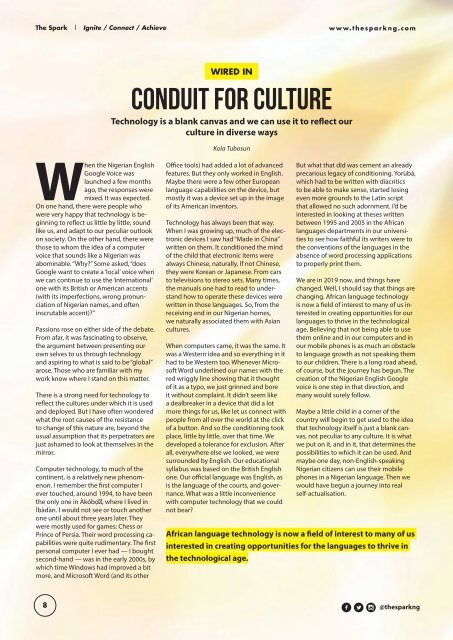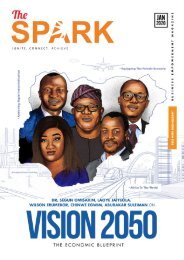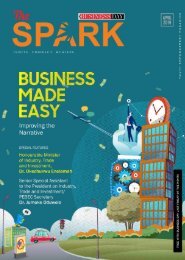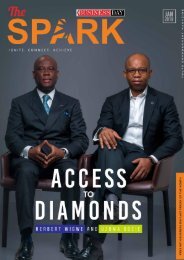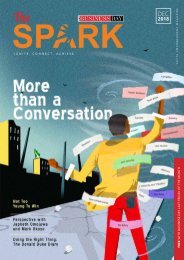Made in Nigeria
September - Made in Nigeria Edition
September - Made in Nigeria Edition
You also want an ePaper? Increase the reach of your titles
YUMPU automatically turns print PDFs into web optimized ePapers that Google loves.
The Spark | Ignite / Connect / Achieve<br />
www.thesparkng.com<br />
WIRED IN<br />
CONDUIT FOR CULTURE<br />
Technology is a blank canvas and we can use it to reflect our<br />
culture <strong>in</strong> diverse ways<br />
Kola Tubosun<br />
When the <strong>Nigeria</strong>n English<br />
Google Voice was<br />
launched a few months<br />
ago, the responses were<br />
mixed. It was expected.<br />
On one hand, there were people who<br />
were very happy that technology is beg<strong>in</strong>n<strong>in</strong>g<br />
to reflect us little by little, sound<br />
like us, and adapt to our peculiar outlook<br />
on society. On the other hand, there were<br />
those to whom the idea of a computer<br />
voice that sounds like a <strong>Nigeria</strong>n was<br />
abom<strong>in</strong>able. “Why?” Some asked, “does<br />
Google want to create a ‘local’ voice when<br />
we can cont<strong>in</strong>ue to use the ‘<strong>in</strong>ternational’<br />
one with its British or American accents<br />
(with its imperfections, wrong pronunciation<br />
of <strong>Nigeria</strong>n names, and often<br />
<strong>in</strong>scrutable accent)?”<br />
Passions rose on either side of the debate.<br />
From afar, it was fasc<strong>in</strong>at<strong>in</strong>g to observe,<br />
the argument between present<strong>in</strong>g our<br />
own selves to us through technology<br />
and aspir<strong>in</strong>g to what is said to be “global”<br />
arose. Those who are familiar with my<br />
work know where I stand on this matter.<br />
There is a strong need for technology to<br />
reflect the cultures under which it is used<br />
and deployed. But I have often wondered<br />
what the root causes of the resistance<br />
to change of this nature are, beyond the<br />
usual assumption that its perpetrators are<br />
just ashamed to look at themselves <strong>in</strong> the<br />
mirror.<br />
Computer technology, to much of the<br />
cont<strong>in</strong>ent, is a relatively new phenomenon.<br />
I remember the first computer I<br />
ever touched, around 1994, to have been<br />
the only one <strong>in</strong> Àkóbọ̀, where I lived <strong>in</strong><br />
Ìbàdàn. I would not see or touch another<br />
one until about three years later. They<br />
were mostly used for games: Chess or<br />
Pr<strong>in</strong>ce of Persia. Their word process<strong>in</strong>g capabilities<br />
were quite rudimentary. The first<br />
personal computer I ever had — I bought<br />
second-hand — was <strong>in</strong> the early 2000s, by<br />
which time W<strong>in</strong>dows had improved a bit<br />
more, and Microsoft Word (and its other<br />
Office tools) had added a lot of advanced<br />
features. But they only worked <strong>in</strong> English.<br />
Maybe there were a few other European<br />
language capabilities on the device, but<br />
mostly it was a device set up <strong>in</strong> the image<br />
of its American <strong>in</strong>ventors.<br />
Technology has always been that way.<br />
When I was grow<strong>in</strong>g up, much of the electronic<br />
devices I saw had “<strong>Made</strong> <strong>in</strong> Ch<strong>in</strong>a”<br />
written on them. It conditioned the m<strong>in</strong>d<br />
of the child that electronic items were<br />
always Ch<strong>in</strong>ese, naturally. If not Ch<strong>in</strong>ese,<br />
they were Korean or Japanese. From cars<br />
to televisions to stereo sets. Many times,<br />
the manuals one had to read to understand<br />
how to operate these devices were<br />
written <strong>in</strong> those languages. So, from the<br />
receiv<strong>in</strong>g end <strong>in</strong> our <strong>Nigeria</strong>n homes,<br />
we naturally associated them with Asian<br />
cultures.<br />
When computers came, it was the same. It<br />
was a Western idea and so everyth<strong>in</strong>g <strong>in</strong> it<br />
had to be Western too. Whenever Microsoft<br />
Word underl<strong>in</strong>ed our names with the<br />
red wriggly l<strong>in</strong>e show<strong>in</strong>g that it thought<br />
of it as a typo, we just gr<strong>in</strong>ned and bore<br />
it without compla<strong>in</strong>t. It didn’t seem like<br />
a dealbreaker <strong>in</strong> a device that did a lot<br />
more th<strong>in</strong>gs for us, like let us connect with<br />
people from all over the world at the click<br />
of a button. And so the condition<strong>in</strong>g took<br />
place, little by little, over that time. We<br />
developed a tolerance for exclusion. After<br />
all, everywhere else we looked, we were<br />
surrounded by English. Our educational<br />
syllabus was based on the British English<br />
one. Our official language was English, as<br />
is the language of the courts, and governance.<br />
What was a little <strong>in</strong>convenience<br />
with computer technology that we could<br />
not bear?<br />
But what that did was cement an already<br />
precarious legacy of condition<strong>in</strong>g. Yorùbá,<br />
which had to be written with diacritics<br />
to be able to make sense, started los<strong>in</strong>g<br />
even more grounds to the Lat<strong>in</strong> script<br />
that allowed no such adornment. I’d be<br />
<strong>in</strong>terested <strong>in</strong> look<strong>in</strong>g at theses written<br />
between 1995 and 2005 <strong>in</strong> the African<br />
languages departments <strong>in</strong> our universities<br />
to see how faithful its writers were to<br />
the conventions of the languages <strong>in</strong> the<br />
absence of word process<strong>in</strong>g applications<br />
to properly pr<strong>in</strong>t them.<br />
We are <strong>in</strong> 2019 now, and th<strong>in</strong>gs have<br />
changed. Well, I should say that th<strong>in</strong>gs are<br />
chang<strong>in</strong>g. African language technology<br />
is now a field of <strong>in</strong>terest to many of us <strong>in</strong>terested<br />
<strong>in</strong> creat<strong>in</strong>g opportunities for our<br />
languages to thrive <strong>in</strong> the technological<br />
age. Believ<strong>in</strong>g that not be<strong>in</strong>g able to use<br />
them onl<strong>in</strong>e and <strong>in</strong> our computers and <strong>in</strong><br />
our mobile phones is as much an obstacle<br />
to language growth as not speak<strong>in</strong>g them<br />
to our children. There is a long road ahead,<br />
of course, but the journey has begun. The<br />
creation of the <strong>Nigeria</strong>n English Google<br />
voice is one step <strong>in</strong> that direction, and<br />
many would surely follow.<br />
Maybe a little child <strong>in</strong> a corner of the<br />
country will beg<strong>in</strong> to get used to the idea<br />
that technology itself is just a blank canvas,<br />
not peculiar to any culture. It is what<br />
we put on it, and <strong>in</strong> it, that determ<strong>in</strong>es the<br />
possibilities to which it can be used. And<br />
maybe one day, non-English-speak<strong>in</strong>g<br />
<strong>Nigeria</strong>n citizens can use their mobile<br />
phones <strong>in</strong> a <strong>Nigeria</strong>n language. Then we<br />
would have begun a journey <strong>in</strong>to real<br />
self-actualisation.<br />
African language technology is now a field of <strong>in</strong>terest to many of us<br />
<strong>in</strong>terested <strong>in</strong> creat<strong>in</strong>g opportunities for the languages to thrive <strong>in</strong><br />
the technological age.<br />
8<br />
fli @thesparkng


